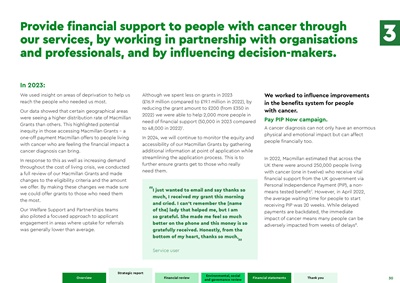
In 2023:
We used insight on areas of deprivation to help us
reach the people who needed us most.
Our data showed that certain geographical areas
were seeing a higher distribution rate of Macmillan
Grants than others. This highlighted potential
inequity in those accessing Macmillan Grants - a
one-off payment Macmillan offers to people living
with cancer who are feeling the financial impact a
cancer diagnosis can bring.
In response to this as well as increasing demand
throughout the cost of living crisis, we conducted
a full review of our Macmillan Grants and made
changes to the eligibility criteria and the amount
we offer. By making these changes we made sure
we could offer grants to those who need them
the most.
Our Welfare Support and Partnerships teams
also piloted a focused approach to applicant
engagement in areas where uptake for referrals
was generally lower than average.
Although we spent less on grants in 2023
(£16.9 million compared to £19.1 million in 2022), by
reducing the grant amount to £200 (from £350 in
2022) we were able to help 2,000 more people in
need of financial support (50,000 in 2023 compared
to 48,000 in 2022)1.
In 2024, we will continue to monitor the equity and
accessibility of our Macmillan Grants by gathering
additional information at point of application while
streamlining the application process. This is to
further ensure grants get to those who really
need them.
Provide financial support to people with cancer through
our services, by working in partnership with organisations
and professionals, and by influencing decision-makers.
" I just wanted to email and say thanks so
much, I received my grant this morning
and cried. I can't remember the [name
of the] lady that helped me, but I am
so grateful. She made me feel so much
better on the phone and this money is so
gratefully received. Honestly, from the
bottom of my heart, thanks so much.
"
Service user
We worked to influence improvements
in the benefits system for people
with cancer.
Pay PIP Now campaign.
A cancer diagnosis can not only have an enormous
physical and emotional impact but can affect
people financially too.
In 2022, Macmillan estimated that across the
UK there were around 250,000 people living
with cancer (one in twelve) who receive vital
financial support from the UK government via
Personal Independence Payment (PIP), a nonmeans
tested benefit7. However, in April 2022,
the average waiting time for people to start
receiving PIP was 20 weeks. While delayed
payments are backdated, the immediate
impact of cancer means many people can be
adversely impacted from weeks of delays8.
30
Environmental, social
and governance review
Financial review
Strategic report
Overview Financial statements Thank you
3